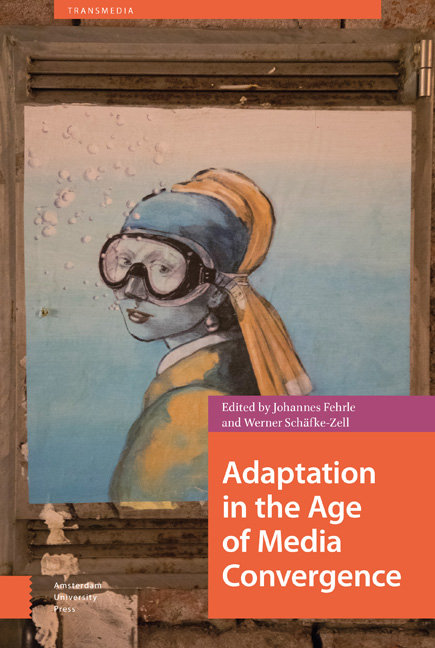Book contents
- Frontmatter
- Contents
- 1 Introduction: Adaptation in a Convergence Environment
- 2 Adaptation as Connection: A Network Theoretical Approach to Convergence, Participation, and Co-Production
- 3 Filing off the Serial Numbers: Fanfiction and its Adaptation to the Book Market
- 4 From Paratext to Polyprocess: The “Quirky” Mashup Novel
- 5 “You Just Got Covered”: YouTube Cover Song Videos as Examples of Para-Adaptation
- 6 Masters of the Universe? Viewers, the Media, and Sherlock's Lead Writers
- 7 Alien Adapted (Again and Again): Fictional Universes between Difference and Repetition
- 8 “Everything is Awesome:” Spreadability and The LEGO Movie
- 9 Localization as Adaptation in the Wolfenstein Franchise
- Index
9 - Localization as Adaptation in the Wolfenstein Franchise
Published online by Cambridge University Press: 21 November 2020
- Frontmatter
- Contents
- 1 Introduction: Adaptation in a Convergence Environment
- 2 Adaptation as Connection: A Network Theoretical Approach to Convergence, Participation, and Co-Production
- 3 Filing off the Serial Numbers: Fanfiction and its Adaptation to the Book Market
- 4 From Paratext to Polyprocess: The “Quirky” Mashup Novel
- 5 “You Just Got Covered”: YouTube Cover Song Videos as Examples of Para-Adaptation
- 6 Masters of the Universe? Viewers, the Media, and Sherlock's Lead Writers
- 7 Alien Adapted (Again and Again): Fictional Universes between Difference and Repetition
- 8 “Everything is Awesome:” Spreadability and The LEGO Movie
- 9 Localization as Adaptation in the Wolfenstein Franchise
- Index
Summary
Abstract
In a globalized market, media products are adapted to fit the constraints of specific markets and appeal to their preferred tastes. As the Wolfenstein franchise is set against the backdrop of the Second World War, it has to address cultural memory in a preferred way. The franchise constructs cultural memory of the Second World War and the holocaust differently, depending on the intended audience. “Family friendly” versions exist, tailored for branded platforms such as NES and iOS, as well as “sanitized” versions for the German market, where legal provisions pose constraints on depictions of Nazism. The resulting corporate adaptations of Wolfenstein games are shown to contradict the intention of legal statutes regarding cultural memory, and lead to further mythologization of Nazism.
Key words: Localization; video games; cultural memory; National Socialism in popular media; Wolfenstein; law and humanities
Introduction
Cinema, video games, comics, and novels continue to deal with the Second World War, National Socialism (NS), and the Holocaust. The foci of these media products range widely from historical documentation aimed at enlightening the audience about the inhumanity of the Holocaust (e.g. Maus; Schindler's List ), to films spicing their plot with Nazi antagonists (e.g. Raiders of the Lost Ark; Captain America ), to mere “Nazisploitation” that amplifies exploitation and splatter with “factual horror” (e.g. Ilsa: She-Wolf of the SS; Inglourious Basterds ).
Regardless of exploitative characteristics, any such media products offer an interpretation of the past. Due to their distinctive influence on popular culture, the Wolfenstein video games have been argued to be a “site of mass-schooling” about the Second World War. Despite their use of retro science fiction elements, the games also feature many historically accurate elements and a meticulously designed Second World War backdrop. The games’ production company filters these factuality signals in two ways. Firstly, when games are designed or redesigned for a broader audience (in the case of the Wolfenstein 3D SNES version and Wolfenstein RPG ), and secondly when they are localized for the German market, where legal restrictions exist regarding the display of NS symbols and NS rule. This process can be called institutional filtering, meaning that production companies and social institutions set constraints on media content.
- Type
- Chapter
- Information
- Adaptation in the Age of Media Convergence , pp. 203 - 228Publisher: Amsterdam University PressPrint publication year: 2019



